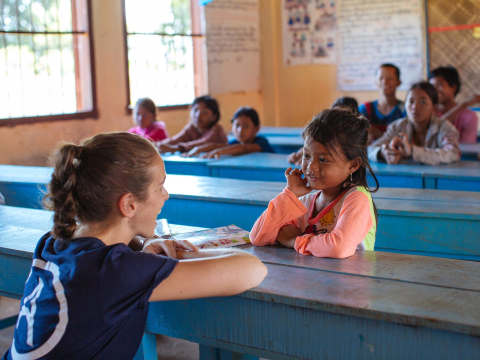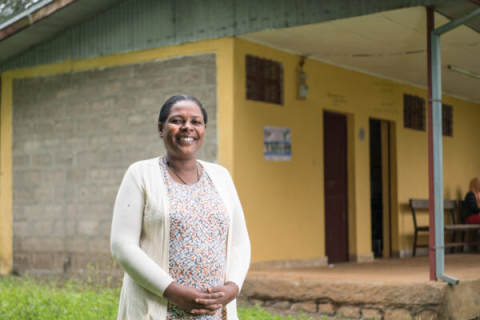Global leaders urged to urgently invest in the scale up of proven malaria interventions and new tools to end malaria
The RBM Partnership to End Malaria is coming together this World Malaria Day to highlight the need for urgent action and further investment to end malaria.
Since the turn of the millennium, global partnership and sustained investment have made a significant impact to the fight against malaria, preventing two billion malaria cases and saving 11.7 billion lives. Today, however, low coverage of existing tools, emerging biological threats and funding shortfalls are brewing a perfect storm for malaria, putting progress at risk.
Recent investments in R&D have produced the most robust pipeline of malaria interventions in over a decade, but an unprecedented shortfall of over 50% in global malaria funding is now holding countries back from maintaining life-saving malaria programmes at current levels.
This World Malaria Day, the RBM Partnership to End Malaria is calling for global stakeholders to invest, innovate and implement for a zero-malaria world.
“It is not acceptable that a child dies from malaria every minute. Country leaders and all partners must urgently step up efforts to get the fight against malaria back on track. Investments in R&D to date have been critical to bring these new malaria interventions and tools to the fore – but countries will not reap the rewards without further to commitment to tailor, scale-up and roll out these innovations where they’re needed most. Now is the time to accelerate innovation and deliver transformative tools and improve approaches to end malaria.” - Dr. Corine Karema, Interim CEO of the RBM Partnership to End Malaria
We must bridge critical global funding gaps
Despite considerable efforts from the malaria community, the global funding gap for malaria is increasing, exacerbated by a shortfall in funding secured at last year’s Global Fund Replenishment. To reach global malaria targets, annual investments must triple by 2030. Leaders must urgently deliver bold investments in malaria control to bridge the funding gap and accelerate progress.
“Funding for malaria plateaued a decade ago. It remains overwhelmingly concentrated among a small number of international actors and is most needed by overstretched countries, often the poorest on the planet. Today on World Malaria Day, we call on countries to urgently deliver bold investments in malaria control to bridge the funding gap and accelerate progress.” - Lady Roslyn Morauta, Chair of the Global Fund Board
Innovation must continue at pace to deliver improved solutions
In recent years, a number of biological threats have emerged that threaten malaria control and elimination efforts, putting progress at risk. Growing insecticide and drug resistance is one of the greatest threats to the fight against malaria, with standard antimalarial drugs, diagnostic and mosquito nets becoming less effective as mosquitoes and malaria parasite evolve to evade them. Despite this resistance, less than half the total resources required to deliver national malaria programmes has been funded due to an unprecedented shortfall at last year’s Global Fund Replenishment and wider economic pressures, holding countries back from maintaining malaria programmes and scaling up new tools to reach everyone at risk.
“Thanks to the innovations over the last few decades, we have tools to combat malaria. However, too many people are still missing out on the services they need to prevent, detect and treat the disease. There is an urgent need to expand access to available tools and strategies, especially for those most vulnerable.” - Dr Daniel Ngamije Madandi, Director of the WHO Global Malaria Programme
This World Malaria Day, the RBM Partnership to End Malaria is calling for global leaders to invest in the scale up of proven malaria interventions and new tools, and for further action at all levels to resource gaps to increase demand and reduce costs. Despite the progress made to develop new vaccines, there is no silver bullet to end malaria. Countries must instead use a diverse package of complementary tools tailored to their local context.
"The fight against malaria has always been a deeply personal battle for me. As part of an inspiring community of scientists at the forefront of this battle, we call for sustained investment in R&D across Africa to accelerate the delivery of new malaria interventions and achieve our shared goal of zero malaria". - Dr Diabate Abdoulaye, Head of Medical Entomology and Parasitology at the Research Institute in Health Sciences (IRSS); Principal Investigator, Target Malaria, Burkina Faso
“While we celebrate many milestones in Asia Pacific we must double down on our commitments and sustain momentum. Nearly 90% of malaria is now concentrated in five countries in the region; and within these countries malaria persists amongst our most vulnerable communities. As countries like China and Sri Lanka along with 40 others have shown – elimination is possible. Let us not forget our brothers and sisters at the last mile and recommit to ending the oldest pandemic.” - Dr. Sarthak Das, Chief Executive Officer, Asia Pacific Leaders Malaria Alliance
As the global malaria community comes together this World Malaria Day, it’s crucial that we continue to invest in malaria control and treatment, innovate to develop and tailor new tools and approaches to those who need them most and implement national strategies to accelerate progress against this age-old disease. It’s time to deliver Zero Malaria.
About the RBM Partnership to End Malaria
The RBM Partnership to End Malaria is the largest global platform for coordinated action against malaria. Originally established as Roll Back Malaria (RBM) Partnership in 1998, it mobilizes for action and resources and forges consensus among partners. The Partnership comprises more than 500 partners, including malaria endemic countries, their bilateral and multilateral development partners, the private sector, nongovernmental and community-based organizations, foundations, and research and academic institutions. The United Nations Office for Project Services (UNOPS) in Geneva, Switzerland, hosts the RBM Partnership Secretariat.
Website: endmalaria.org | Facebook: @RBMPartnership | Twitter: @endmalaria
For additional information, please contact mabel.gunda@endmalaria.org or RBMPartnership@grayling.com.

